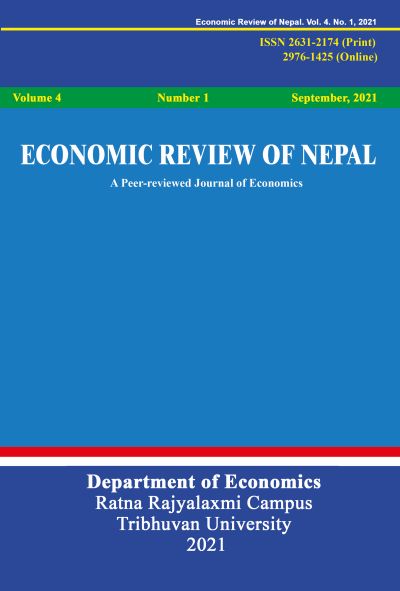Central Bank's Independence and the Golden Rule in Nepal: A Concept Analysis with Dynamic Inconsistency of Monetary Policy
DOI:
https://doi.org/10.3126/ern.v4i1.64119Keywords:
dynamic inconsistency, concept analysis, golden rule, inflation-targeting regime, Nepal Rastra BankAbstract
This paper attempts to study the concept analysis of the central bank's independence and the golden rule in Nepal in relation with the dynamic inconsistency of monetary policy. In 2007, an optimal inflation-rate was assessed, which suggested that it would be beneficial for Nepal to establish a range for inflation targets centered around the optimal inflation rate identified through analysis which would grant autonomy to the Nepal Rastra Bank (NRB) to ensure price stability. However, concerns have arisen regarding potential political influence on the NRB and fiscal challenges, leading to uncertainties about the country's economic sustainability. The Golden Rule, advocating for balanced budgets, is proposed as a potential solution, but its implementation is complicated by Nepal's unique socio-political context. This research, drawing on economic theories from Kydland, Prescott, Barro, Gordon, and others, delved into the complex relationship between central bank independence, fiscal policy, and consistency in Nepal. The nation's economic path hinges on effectively navigating these complexities to strike a balance between immediate political needs and long-term stability. The concept of dynamic inconsistency underscores the risks associated with prioritizing short-term gains, emphasizing the necessity for strategic decision-making in economic governance. Ultimately, Nepal confronts the challenge of aligning its economic policies to ensure resilience against short-term pressures while promoting enduring long-term stability.
Downloads
Downloads
Published
How to Cite
Issue
Section
License
Copyright (c) 2021 Department of Economics, Ratna Rajyalaxmi Campus

This work is licensed under a Creative Commons Attribution-NonCommercial 4.0 International License.
This license enables reusers to distribute, remix, adapt, and build upon the material in any medium or format for noncommercial purposes only, and only so long as attribution is given to the creator.




